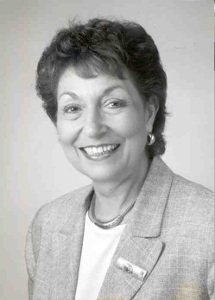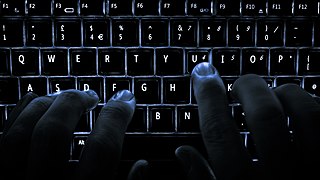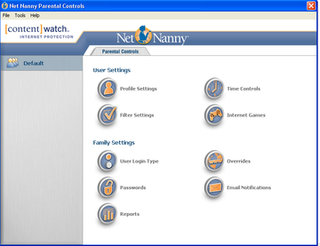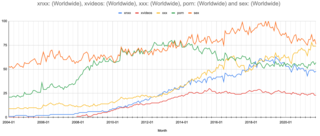An Internet filter is software that restricts or controls the content an Internet user is capable to access, especially when utilized to restrict material delivered over the Internet via the Web, Email, or other means. Content-control software determines what content will be available or be blocked.

Parental controls are features which may be included in digital television services, computers and video games, mobile devices and software that allow parents to restrict the access of content to their children. These controls were created to assist parents in their ability to restrict certain content viewable by their children. This may be content they deem inappropriate for their age, maturity level or feel is aimed more at an adult audience. Parental controls fall into roughly four categories: content filters, which limit access to age inappropriate content; usage controls, which constrain the usage of these devices such as placing time-limits on usage or forbidding certain types of usage; computer usage management tools, which enforces the use of certain software; and monitoring, which can track location and activity when using the devices.

The Children's Internet Protection Act (CIPA) is one of a number of bills that the United States Congress proposed to limit children's exposure to pornography and explicit content online.
Secure Web SmartFilter EDU, formerly known as Bess, is a brand of content-control software made by Secure Computing Corporation, which acquired maker N2H2 in 2003; it is usually used in libraries and schools. The main purpose of the system is as an Internet filter, blocking minors using the public computers from accessing web content deemed inappropriate by the local administrators of the system based on the Acceptable Use Policy of the organization. The system is not installed locally, but installs on the server between the users and the open Internet. This feature makes it harder to bypass, though it is not uncommon for students with more extensive computer knowledge to attempt to bypass the system. The system allows for teachers or administrators to temporarily bypass the system if they need to access blocked sites for educational purposes.

Judith Fingeret Krug was an American librarian, freedom of speech proponent, and critic of censorship. Krug became director of the Office for Intellectual Freedom at the American Library Association in 1967. In 1969, she joined the Freedom to Read Foundation as its executive director. Krug co-founded Banned Books Week in 1982.
Ashcroft v. American Civil Liberties Union, 535 U.S. 564 (2002), followed by 542 U.S. 656 (2004), was a decision of the United States Supreme Court, ruling that the Child Online Protection Act (COPA) was unconstitutional as a violation of the First Amendment's guarantee of freedom of speech.
K9 Web Protection is discontinued content-control software developed by Blue Coat Systems. In 2016, K9 Web Protection was acquired by Symantec as part of the company's purchase of Blue Coat Systems. In April 2019, Symantec announced that K9 Web Protection would be discontinued and would no longer be made available for download or purchase. Technical support for the software ended on June 30, 2019.
The Deleting Online Predators Act of 2006 (DOPA) is a bill brought before the United States House of Representatives on May 9, 2006 by Republican Pennsylvania Representative (R-PA) Mike Fitzpatrick. The bill, if enacted, would have amended the Communications Act of 1934, requiring schools and libraries that receive E-rate funding to protect minors from online predators in the absence of parental supervision when using "Commercial Social Networking Websites" and "Chat Rooms". The bill would prohibit schools and libraries from providing access to these types of websites to minors or create restrictions to use of these type of sites. The bill also would require the institutions to be capable of disabling the restrictions for "use by an adult or by minors with adult supervision to enable access for educational purposes."
In the United States, internet censorship is the suppression of information published or viewed on the Internet in the United States. The First Amendment of the United States Constitution protects freedom of speech and expression against federal, state, and local government censorship.
Internet censorship in the United Kingdom is conducted under a variety of laws, judicial processes, administrative regulations and voluntary arrangements. It is achieved by blocking access to sites as well as the use of laws that criminalise publication or possession of certain types of material. These include English defamation law, the Copyright law of the United Kingdom, regulations against incitement to terrorism and child pornography.

Cyber ethics is the philosophic study of ethics pertaining to computers, encompassing user behavior and what computers are programmed to do, and how this affects individuals and society. For years, various governments have enacted regulations while organizations have defined policies about cyberethics.
United States v. American Library Association, 539 U.S. 194 (2003), was a decision in which the United States Supreme Court ruled that the United States Congress has the authority to require public schools and libraries receiving E-Rate discounts to install web filtering software as a condition of receiving federal funding. In a plurality opinion, the Supreme Court ruled that public school and library usage of Internet filtering software does not violate their patrons' First Amendment free speech rights and that the Children's Internet Protection Act is not unconstitutional.

Net Nanny is a content-control software suite marketed primarily towards parents as a way to monitor and control their child's computer and phone activity.

Internet pornography is any pornography that is accessible over the internet; primarily via websites, FTP connections, peer-to-peer file sharing, or Usenet newsgroups. The greater accessibility of the World Wide Web from the late 1990s led to an incremental growth of internet pornography, the use of which among adolescents and adults has since become increasingly popular.
Mobicip is a cloud-based Internet filter and parental control service that works on all major platforms of mobile Internet devices. Mobicip is supported on various types of devices used by families such as the iPhone, iPod Touch, iPad, Android, Windows, macOS and Chromebook. Mobicip was launched in 2008. Mobicip used to be a safe browser app but is now a VPN on iOS & Android that filters any browser. Mobicip is a parental control application that protects internet, regulates screentime, allows/blocks apps and tracks location as well, while allowing parents to customize the configuration and view activity reports. Using the web-based or mobile applications, parents can customize the filter to set up whitelists and blacklists, block categories of websites, and manage users and devices. In addition, the application lets parents monitor the Internet activity on the device, group the activity by user, by allowed or blocked websites, sort by time etc.
Enough Is Enough is an American non-profit organization whose stated purpose is to make the Internet safer for families and children. It carries out lobbying efforts in Washington, D.C., and played a role in the passage of the Communications Decency Act of 1996, the Child Online Protection Act of 1998, and the Children's Internet Protection Act of 2000. The group is based in the Commonwealth of Virginia. They sometimes refer to themselves acronymically as EIE.
Web filtering in schools blocks students from inappropriate content across the web, while allowing sites that are selected by school administrators. Rather than simply blocking off large portions of the Internet, many schools are utilizing customizable web filtering systems that provide them with greater control over which sites are allowed and which are blocked. Schools will typically block NSFW content, social media websites, games, distracting websites, websites that harm academic integrity etc.
The precise number of websites blocked in the United Kingdom is unknown. Blocking techniques vary from one Internet service provider (ISP) to another with some sites or specific URLs blocked by some ISPs and not others. Websites and services are blocked using a combination of data feeds from private content-control technology companies, government agencies, NGOs, court orders in conjunction with the service administrators who may or may not have the power to unblock, additionally block, appeal or recategorise blocked content.

Online predators are individuals who commit child sexual abuse that begins or takes place on the Internet.
John W. Berry is an American librarian. Berry served as president of the American Library Association from 2001 to 2002, leading the profession's response to the Children's Internet Protection Act.







